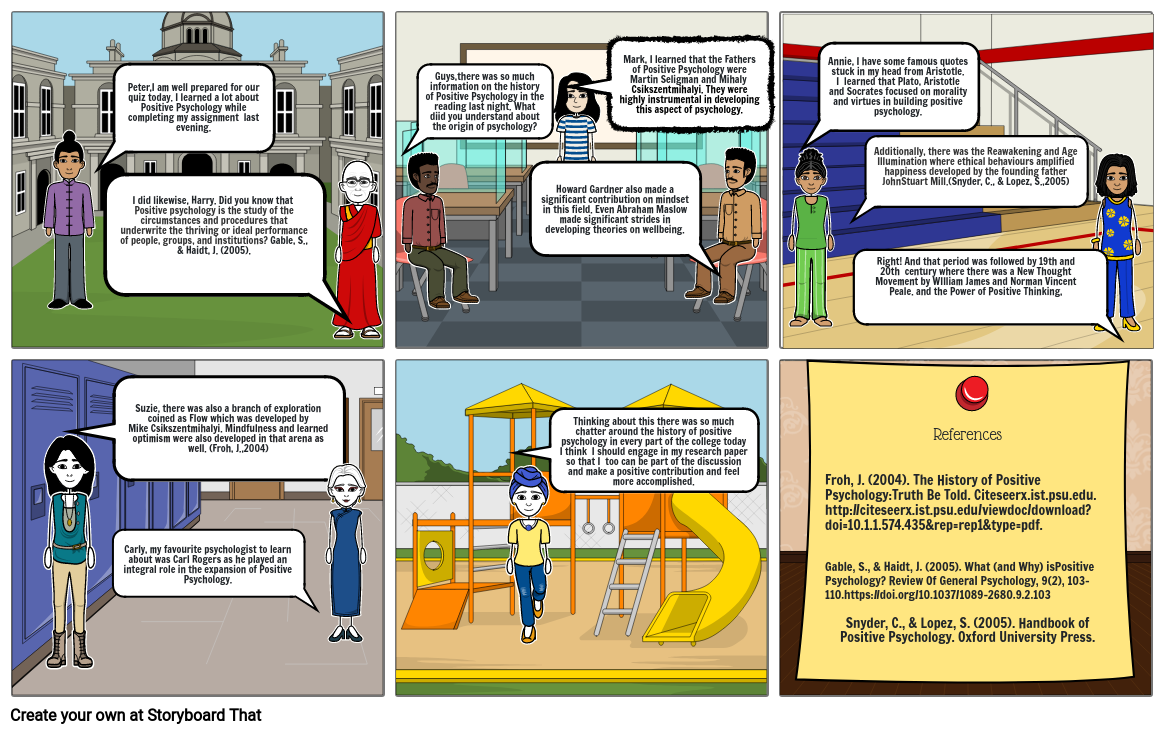What is the history of Positive Psychology?

Storyboard Text
- Peter,I am well prepared for our quiz today. I learned a lot about Positive Psychology while completing my assignment last evening.
- I did likewise, Harry. Did you know that Positive psychology is the study of the circumstances and procedures that underwrite the thriving or ideal performance of people, groups, and institutions? Gable, S., & Haidt, J. (2005).
- Guys,there was so much information on the history of Positive Psychology in the reading last night. What diid you understand about the origin of psychology?
- Howard Gardner also made a significant contribution on mindset in this field. Even Abraham Maslow made significant strides in developing theories on wellbeing.
- Mark, I learned that the Fathers of Positive Psychology were Martin Seligman and Mihaly Csikszentmihalyi. They were highly instrumental in developing this aspect of psychology.
- Annie, I have some famous quotes stuck in my head from Aristotle. I learned that Plato, Aristotle and Socrates focused on morality and virtues in building positive psychology.
- Additionally, there was the Reawakening and Age Illumination where ethical behaviours amplified happiness developed by the founding father JohnStuart Mill.(Snyder, C., & Lopez, S.,2005) Right! And that period was followed by 19th and 20th century where there was a New Thought Movement by WIlliam James and Norman Vincent Peale. and the Power of Positive Thinking,
-
- Suzie, there was also a branch of exploration coined as Flow which was developed by Mike Csikszentmihalyi. Mindfulness and learned optimism were also developed in that arena as well. (Froh, J.,2004)
- Carly, my favourite psychologist to learn about was Carl Rogers as he played an integral role in the expansion of Positive Psychology.
- Thinking about this there was so much chatter around the history of positive psychology in every part of the college today I think I should engage in my research paper so that I too can be part of the discussion and make a positive contribution and feel more accomplished.
- References Froh, J. (2004). The History of Positive Psychology:Truth Be Told. Citeseerx.ist.psu.edu. http://citeseerx.ist.psu.edu/viewdoc/download?doi=10.1.1.574.435&rep=rep1&type=pdf.Gable, S., & Haidt, J. (2005). What (and Why) isPositive Psychology? Review Of General Psychology, 9(2), 103-110.https://doi.org/10.1037/1089-2680.9.2.103Snyder, C., & Lopez, S. (2005). Handbook of Positive Psychology. Oxford University Press.
Over 30 Million Storyboards Created

